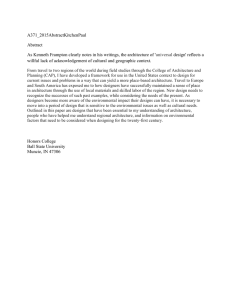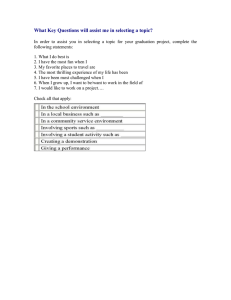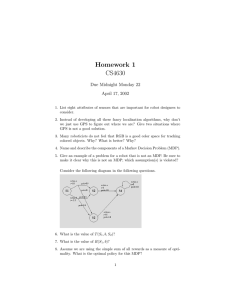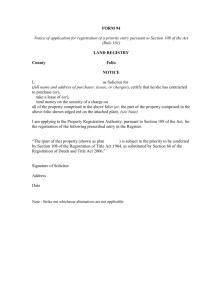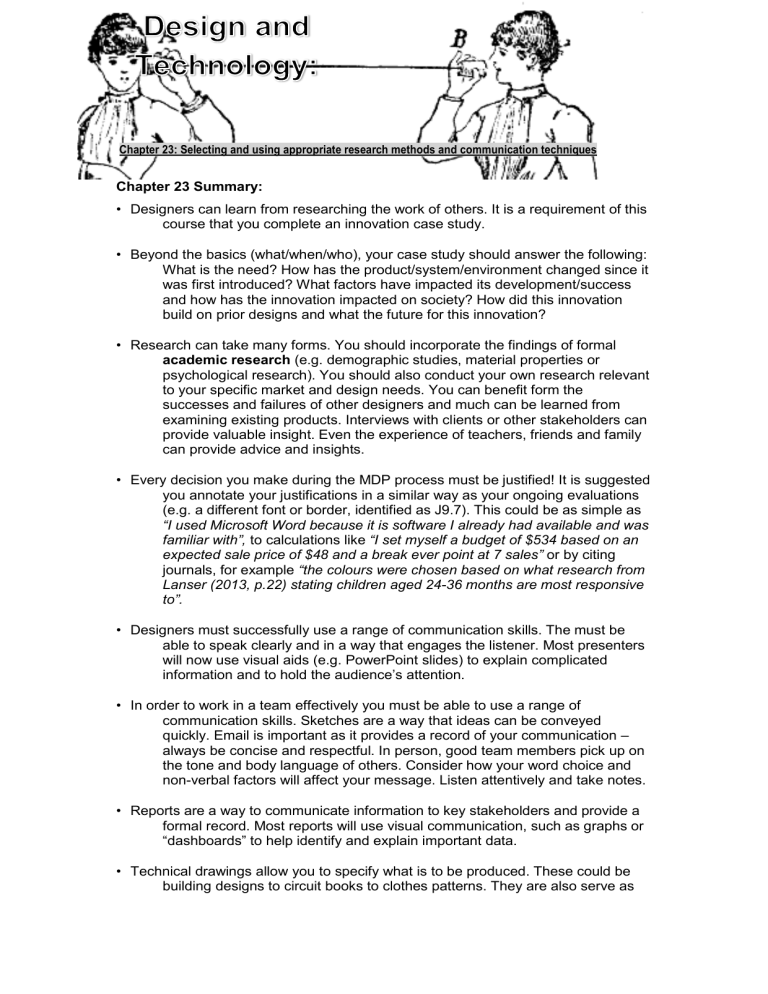
Stage 6 Chapter 23: Selecting and using appropriate research methods and communication techniques Chapter 23 Summary: • Designers can learn from researching the work of others. It is a requirement of this course that you complete an innovation case study. • Beyond the basics (what/when/who), your case study should answer the following: What is the need? How has the product/system/environment changed since it was first introduced? What factors have impacted its development/success and how has the innovation impacted on society? How did this innovation build on prior designs and what the future for this innovation? • Research can take many forms. You should incorporate the findings of formal academic research (e.g. demographic studies, material properties or psychological research). You should also conduct your own research relevant to your specific market and design needs. You can benefit form the successes and failures of other designers and much can be learned from examining existing products. Interviews with clients or other stakeholders can provide valuable insight. Even the experience of teachers, friends and family can provide advice and insights. • Every decision you make during the MDP process must be justified! It is suggested you annotate your justifications in a similar way as your ongoing evaluations (e.g. a different font or border, identified as J9.7). This could be as simple as “I used Microsoft Word because it is software I already had available and was familiar with”, to calculations like “I set myself a budget of $534 based on an expected sale price of $48 and a break ever point at 7 sales” or by citing journals, for example “the colours were chosen based on what research from Lanser (2013, p.22) stating children aged 24-36 months are most responsive to”. • Designers must successfully use a range of communication skills. The must be able to speak clearly and in a way that engages the listener. Most presenters will now use visual aids (e.g. PowerPoint slides) to explain complicated information and to hold the audience’s attention. • In order to work in a team effectively you must be able to use a range of communication skills. Sketches are a way that ideas can be conveyed quickly. Email is important as it provides a record of your communication – always be concise and respectful. In person, good team members pick up on the tone and body language of others. Consider how your word choice and non-verbal factors will affect your message. Listen attentively and take notes. • Reports are a way to communicate information to key stakeholders and provide a formal record. Most reports will use visual communication, such as graphs or “dashboards” to help identify and explain important data. • Technical drawings allow you to specify what is to be produced. These could be building designs to circuit books to clothes patterns. They are also serve as Stage 6 Chapter 23: Selecting and using appropriate research methods and communication techniques an important agreement between the designer, client and other parties (e.g. government approvals, builders, manufacturers). They often serve as the basis for estimating costs. • Advertising and packaging are forms of one-way communication with your target market. • Communication has become much faster over the last 10-15 years with the ability to send large documents, design drawings and 3D models to the other side of the world instantly. Skype has made international phone calls very cheap. Many people have access to their work while away from the office are expected to be contactable outside of work hours. The expectations of record keeping having increased. • The internet has made it much easier for companies to communicate directly with their customers. Attempts to use services such as Twitter have backfired on many organisations. • High-quality information is much more readily available. Scientific journals and government statistics are available online. Video hosting sites (such as YouTube) provide tutorials on almost every subject. Forums can provide solutions and advice to most technical problems. • Spreadsheets and statistical software can process and present data effectively. • Your folio is your most important form of communication with the markers. They will only be able to mark you based on what you effectively communicate to them. These skills transfer to professional situations where a folio of work is how you demonstrate your skills to employers and clients. • Graphic design considers how choices in layout, colour and font attract and direct your viewer and help to set the tone of you message. These factors alone can result in the success or failure of your design. • Consider the principles of graphic design in the way you present your folio. Your text must be legible and presented in a clear, consistent and meaningful way. Consider the use of lines, images and formatting in order to guide the marker and highlight information. Stage 6 Chapter 23: Selecting and using appropriate research methods and communication techniques Chapter 23 Review Questions: 1. How has your MDP built on prior designs and what the future it? 2. Describe the three innovations introduced in your lifetime and explain how they’ve impacted on individuals, society and the environment 3. Produce a timeline of developments related to your MDP (e.g. sport, education, art, childrearing, toys, magazines, food etc.) 4. What are some of the negative effects of mass-communication since 2000? 5. What is the advantages of using a spreadsheet to estimate and track your Stage 6 Chapter 23: Selecting and using appropriate research methods and communication techniques costs? 6. Use Microsoft Excel (or similar) to produce a chart representing your activities for the past seven days ESSAY TOPIC Critically evaluate one of the following statements: A successful poster has more to do with how it looks than what is written. The most important function of a business email to protect oneself from possible criticism or damages. The internet does not allow us to do any thing new – it just allows us to do it faster.
